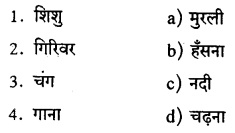You can Download शिक्षा Questions and Answers Pdf, Notes, Summary of KSEEB Solutions For Class 8 Hindi Karnataka State Board to help you to revise complete Syllabus and score more marks in your examinations.
शिक्षा Questions and Answers, Notes, Summary Questions and Answers
I. एक वाक्य में उत्तर लिखिए
KSEEB Solutions For Class 8 Hindi प्रश्न 1.
शिशु ने रो-रोकर क्या सीखा है?
उत्तरः
शिशु ने रो-रोकर हँसना सीखा है ।।
KSEEB Solutions For Class 8 Hindi प्रश्न 2.
शिशु ने लघु होकर क्या सीखा है?
उत्तरः
शिशु ने लघु होकर बढ़ना सीखा है।
8th Hindi Notes प्रश्न 3.
शिशु ने चलना कैसे सीखा है?
उत्तरः
शिशु ने गिर-गिरकर चलना सीखा है।
Hindi Notes 8th Standard प्रश्न 4.
शिशु ने सब कुछ कहाँ आकर सीखा है?
उत्तरः
शिशु ने सब कुछ दुनिया में आकर सीखा है ।
KSEEB Solutions For Class 8 Hindi Chapter 4 प्रश्न 5.
चंगों से क्या सीखा है?
उत्तर:
चंगों से चढ़ना सीखा है।
KSEEB Hindi Solutions For Class 8 प्रश्न 6.
मुरली ने गाना कैसे सीखा है?
उत्तरः
मुरली ने उर छेदकर गाना सीखा है।
Hindi 8th Standard Notes प्रश्न 7.
वारिधरों ने पानी बरसाना कैसे सीखा है?
उत्तरः
मिट-मिटकर वारिधरों ने पानी बरसाना सीखा है।
Shiksha Hindi Poem 8th Standard प्रश्न 8.
नदियों ने बहुना कैसे सीखा है?
उत्तरः
गिर-गिरकर नदियों ने बहना सीखा है।
II. दो-तीन वाक्यों में उत्तर लिखिए ।
Shiksha Poem In Hindi 8th Class प्रश्न 1.
शिशु ने दुनिया में आकर पहले क्या-क्या सीखा है और कैसे सीखा है?
उत्तरः
शिशु ने दुनिया में आकर सबसे पहले रो-रोकर हँसना सीखा है और लघु होकर बढ़ना सीखता है। गिर-गिरकर चलना सीखता है
Shiksha 8th Standard Poem Hindi Notes प्रश्न 2.
पानी कैसे बरसता है? नदियाँ कैसे बहती है?
उत्तरः
बादलों ने मिट-मिटकर पानी बरसाना सीखा है। और पर्वत से गिर-गिरकर नदियों ने बहना सीखा है।
III. अनुरूप शब्द लिखिए :
- चंग : चढ़ना :: वारिधर : ————
- दुनिया : जगत :: उर : ———–
- नदी : बहना :: मुरली : ———
- भूख-प्यास : शब्द युग्म :: मिट-मिटकर : ———-
उत्तरः
- चंग : चढ़ना :: वारिधर : बरसाना
- दुनिया : जगत :: उर : छाती
- नदी : बहना :: मुरली : गाना
- भूख-प्यास : शब्द युग्म :: मिट-मिटकर : द्विरुक्ति
IV. जोड़कर लिखिए :

उत्तरः
1) b
2) c
3) d
4 )a
v. विलोम शब्द लिखिए ।
- रोना x हँसना ।
- चढ़ना x उतरना
- मिटना x घटना/जोड़ना
- गिरना x उठना
VI. अन्य वचन रूप लिखिए :
- नदी – नदियाँ
- मुरली – मुरलियाँ
- वाणी – वाणी
- स्मृति – स्मृतियाँ
VII. पर्यायवाची शब्द लिखिए :
- शिशु – बच्चा
- वारिधर – बादल
- दुनिया – संसार, प्रपंच
- चंग – चढ़ना
VIII. तारवाले, थापवाले, अन्य संगीत साधनों की सूची
सितार, तबला, मुरली, बीन, वीणा, उफली, ढोलक, शहनाई, सारंगी, गिटार, हारमोनियम्, घटम्

IX. नमूने के अनुसार सही वर्तनीवाले शब्द लिखिए :
उदा : वारिधर, वारिघर (वारिधर)
- दूनिया, दुनिया ……..
- शिशु, शीषु’ ………….
- मुर्ली, मुरली ………….
- गीर, गिर ………
उत्तरः
- दूनिया, दुनिया (दुनिया)
- शिशु, शीषु’ (शिशु)
- मुर्ली, मुरली (मुरली)
- गीर, गिर (गिर)
X. आठ नदियों में अधूरे नाम दिए गए हैं। उन्हें पूरा कीजिए।
(मंदाकिनी, घाघरा, कावेरी, गंडक, महानंद, अलकनंदा, यमुनो, कोसी)

पूरक वाचन
8th Standard Hindi Shiksha Question Answer प्रश्न 1.
फूल और कलि से हमने क्या सीखा है?
उत्तरः
फूल से हँसना सीखा और कली से मुसकाना सीखा है।
Shiksha 8th Standard Poem Hindi प्रश्न 2.
नदी और कोयल से क्या सीख सकते हैं ?
उत्तरः
नदी से जीवन में बहने सीखा और कोयल से मधुर गीत हरदम गाना सीखा है।
8th Standard Hindi Poem Shiksha प्रश्न 3.
चंदामामा तथा मेघ हमें क्या सिखाते हैं ?
उत्तरः
नदी से जीवन में बहने सीखा और कोयल से मधुर गीत. हरदम गाना सीखा है।
Class 8 Hindi Chapter 4 Poem Shiksha प्रश्न 4.
हमें किस प्रकार की सीख की आवश्यकता है?
उत्तरः
हमें सदा हम सीखें जीवन में हम रहें तो जीना, सीखना और शिक्षाएँ हो नित ऐसी ही जीवन भरा रहे सीखना है।
कवि का नाम : ठाकुर गोपाल शरण सिंह
काले : सन् 1892 – 1960
स्थल : रीवाँ (झाँसी)
कृतियोँ : ‘जगदालोक’ इनका महाकाव्य है।
माधवी, मानवी, कादंबिनी, ज्योतिष्मति, संचिता, सुमन, विश्वगीत और ग्रामिका इनके मुक्तक काव्य है ।
‘गामिका’ और ‘जगदालोक’ उत्तर प्रदेश सरकार से पुरस्कृत हैं ।।
शिक्षा Summary in Hindi
शिक्षा पाठ का सारांश:
In this poem, the poet gives instances of how he learn and gained knowledge through experiences. If one has to find success he has to follow many routes and undergo many trials. One cannot find success without trials and tribulations.
1. Once the child is born it learns to laugh after repeated cries. If the child does not cry then nobody will notice it, not even its mother. If the child has to satisfy its hunger or its likes then it has to cry. This way it grows. After repeated falls it learns how to walk. It is fed with nutritious food and thereby the child grows hale and healthy.
2. The birds learn to fly as they have to quench their thirst and hunger. The younger ones in the
nest wait for their mother to get food to feed them. Once their wings are strong, they learn to fly. The bamboo is holed in equidistant, so that it can make beautiful music, where it is called flute.
3. Clouds melt and drop as rain. If clouds do not melt then earth does not get rain. Those clouds that do not melt are carried away by the wind and later hits huge mountains and fall as rain. This water falls from great height and forms beautiful waterfall. Rivers learns to flow after it learns to make its way through hills and valleys. They flow through mountains and give us abundant natural wealth.
शिक्षा Summary in Kannada



शिक्षा Summary in English
(In this poem the poet gives several examples to show how education is gained through experience. One has to face various kinds of difficulties in life for success. We can never achieve anything without hard work.)
The child learns to laugh after crying again and again after coming into this world. It learns to grow up from being small. It learns to walk after falling down again and again.
After flying here and there the kite learns to ascend. The sweet music that we hear from a flute is possible only because there are holes in its heart.
Clouds are formed and destroyed several times. Only then does it rain? Similarly, rivers learned to flow only after falling from tall hills and mountains.
Nothing can be got easily in this world. There are hard work and sacrifice behind everything.